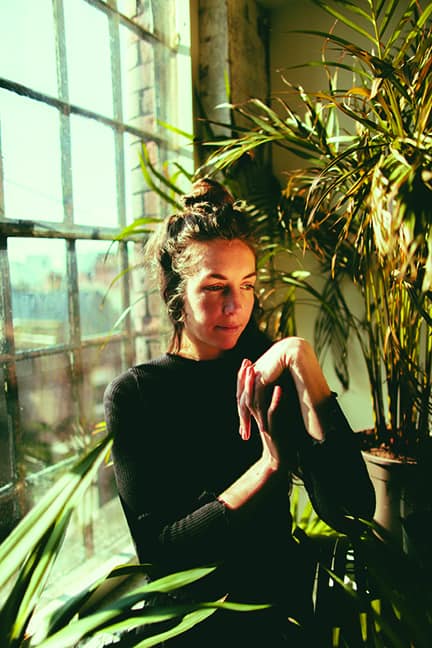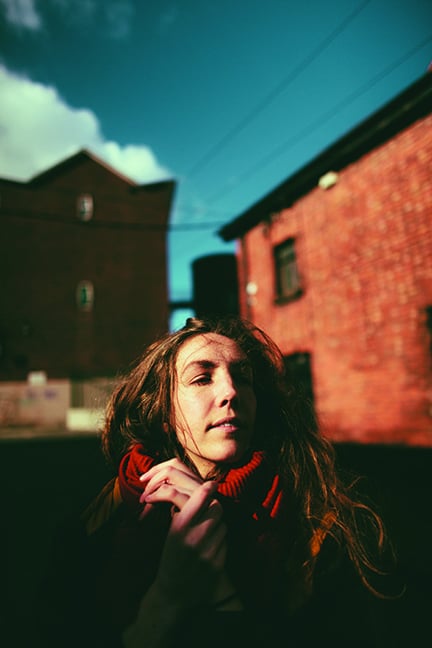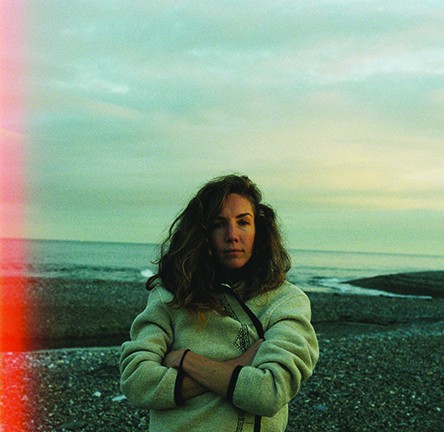Anna Mieke Onstage at the Hawthorne Barn
by Lee Roscoe

Cape Codders will have a onetime chance (for now) to hear
Irish singer/songwriter Anna Mieke play at the Hawthorne Barn,
Friday, May 13 as part of the Twenty Summers programming.
Mieke produced and released her first album, Idle Mind, on her
own, and its success has allowed her to tour Spain, the U.K.,
and Ireland, playing clubs and concert halls. This is her first trip
to the U.S. as an adult, although she remembers being driven
through Manhattan as a child in a taxi and marveling at how
tall the buildings were.
Born in Dublin, Mieke grew up in Wicklow County, in “a
rural village which is now a huge metropolis,” she says. “Where
once there were cows and fields, now is Chinese takeaway, and
hotels.” She lives in the same county but “in the hills, where it
is beautifully green outside the windows, and I look at Mount
Djouce.” The proverbial Irish sheep graze beyond, but
she cautions, “Sheep have destroyed Ireland by creating
huge plains of land exposed from grazing; where there
were once trees and fields, there is now brown scrub.”
This same duality of the bitter and the sweet exists
in her music, the contrasts of modern and ancient, of
urban and rural. Mieke’s songs are moody dramas;
they’ve a foot in the roots of Irish folk songs and a
head in the skies of dream and experimentation. With
her lyrics enclosed by haunting instrumentation, bells,
percussion, acoustic guitar, strings, and by her voice’s
catch in her throat, and lyrical, feathery tone – medieval
drone, modern electrification, and rhythm meld.
Her musical mates, Matthew Jacobson and Ryan Hargadon,
bring their own aesthetic. “Matthew is a percussionist. His
playing brings a flourish of jazz to my band,” she says. He
will even use egg slicers, butter knives, and knitting needles
to make sound. Ryan plays sax, clarinet, electronics with
delayed effects, and synth, and Mieke plays acoustic and
electric guitar, one built in 1936, as well as bouzouki. These
and other instruments will spark a reason for her to write a
song around their particular gestalt.
The second youngest of five children, girls save for the
oldest—there was always music in the house, although none
were musicians. She feels it’s a bit of a cliché to name her
influences, that people say they are influenced by this one or
that one, because it sounds right to claim so but you really don’t
know what sinks in and what does not. “It could be songs we
sang in school.” She did listen to a good deal of Bob Dylan, the
Beatles, and Nick Drake and she read Dylan Thomas while in
the faraway reaches of Donegal with her family, coincidentally
near a ramshackle cottage where the poet had gone to get sober.
(Recently she’s been enjoying editions of modern poets from the
Poetry Foundation.) But mostly she credits her barrister uncle
with a passion for music who lit the fire, sending her CDs from
his massive collection, blaring Brazilian and West African music
out the windows of his old Saab as they drove through Ireland on
family holidays, bringing her to the WOMAD (World of Music,
Art and Dance) festival in the U.K.
She’s largely self-taught but did study cello and piano
for years; while she did so she found her mind wandering (as
she picked up tunes by ear rather than sight reading) to create
original melodies in her head instead of practicing the classics.
“Writing words was harder. I still struggle with it,” she says.
Yet her words and music flow organically; as in “Aurillac”: Witnessing your red lit game/Empty eyes roll over my spine/We heard/ Barking dogs in the flickering light/ Or in, “Warped Window”: Lay your head down next to mine/ Till your dust is the clay on which we lie/ Or in the title track for her
album: Strange talkings I have heard/ Strange warnings I’ve been told… /
Made a bed of rain to cradle you/ Wrapped in words to keep you warm

About a YouTube video of that song in a
glamorously shabby wreck of a building about to be
demolished, construction cranes in Dublin adjacent, she
says, “Maybe that transience/temporariness is itself quite
inspiring…creating things, be it music or whatever, in a
place you know won’t exist for much longer. There’s a
certain kind of feeling in that.”
She’s played professionally for about seven or
eight years. For the prior six she was doing music at
night and working two jobs, raising funds for an annual
National Picnic Day, on which “thousands of counties
share food with neighbors in gardens, estates and roads,”
and teaching English to Brazilians, Russians, Saudis, and
Eastern Europeans. Sometimes she misses the inspiration
teaching gave her. “There were words in my head from
stimulating super social conversations which would come
back in scraps” while working on a song. Although, she
would have to allow herself to “break free from the chains
of grammar” to compose the lyrics.
Now she says, “I have to kick myself; I am fully
self-employed doing my passion.” As is her partner of
eight years, Brían Mac Gloinn, whose two-man band,
Ye Vagabonds, plays more traditional music. (According
to Mieke, they don’t play together because they need their
own musical space, and it’s better for their relationship.)
“I don’t want to be boxed” to one style, Mieke says.
She wants to move on from Idle Mind to other turf, and
while she is shy about revealing it, she will be introducing
the recent creations with the older when she is in concert
here (as well as in D.C., from whence she moves to
Manhattan’s Irish Arts Center). Her upcoming album (the
title of which is just being decided) has some innovative
instrumentation to accompany the new material: viola,
flute, and harp. Though her themes may stay the same:
“Family ties, memory/loss of it, decay/age, a lot of
references to nature,” she emphasizes that “my style has
changed since Idle Mind. I don’t write like that anymore.
My musical vocabulary is different.”
Anna Mieke performs on Friday, May 13, 7 p.m.
(doors open at 6 p.m.) at the Hawthorne Barn, 29 Miller
Hill Rd., Provincetown. For tickets ($30) and information visit 20summers.org.











